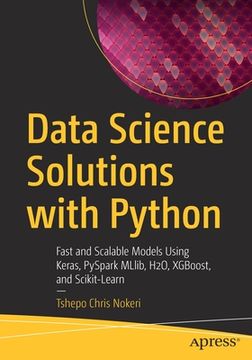Share
Data Science Solutions with Python: Fast and Scalable Models Using Keras, Pyspark Mllib, H2o, Xgboost, and Scikit-Learn
Tshepo Chris Nokeri
(Author)
·
Apress
· Paperback
Data Science Solutions with Python: Fast and Scalable Models Using Keras, Pyspark Mllib, H2o, Xgboost, and Scikit-Learn - Nokeri, Tshepo Chris
Choose the list to add your product or create one New List
✓ Product added successfully to the Wishlist.
Go to My Wishlists
Origin: U.S.A.
(Import costs included in the price)
It will be shipped from our warehouse between
Friday, August 09 and
Friday, August 16.
You will receive it anywhere in United Kingdom between 1 and 3 business days after shipment.
Synopsis "Data Science Solutions with Python: Fast and Scalable Models Using Keras, Pyspark Mllib, H2o, Xgboost, and Scikit-Learn"
Apply supervised and unsupervised learning to solve practical and real-world big data problems. This book teaches you how to engineer features, optimize hyperparameters, train and test models, develop pipelines, and automate the machine learning (ML) process. The book covers an in-memory, distributed cluster computing framework known as PySpark, machine learning framework platforms known as scikit-learn, PySpark MLlib, H2O, and XGBoost, and a deep learning (DL) framework known as Keras. The book starts off presenting supervised and unsupervised ML and DL models, and then it examines big data frameworks along with ML and DL frameworks. Author Tshepo Chris Nokeri considers a parametric model known as the Generalized Linear Model and a survival regression model known as the Cox Proportional Hazards model along with Accelerated Failure Time (AFT). Also presented is a binary classification model (logistic regression) and an ensemble model (Gradient Boosted Trees). The book introduces DL and an artificial neural network known as the Multilayer Perceptron (MLP) classifier. A way of performing cluster analysis using the K-Means model is covered. Dimension reduction techniques such as Principal Components Analysis and Linear Discriminant Analysis are explored. And automated machine learning is unpacked. This book is for intermediate-level data scientists and machine learning engineers who want to learn how to apply key big data frameworks and ML and DL frameworks. You will need prior knowledge of the basics of statistics, Python programming, probability theories, and predictive analytics. What You Will LearnUnderstand widespread supervised and unsupervised learning, including key dimension reduction techniquesKnow the big data analytics layers such as data visualization, advanced statistics, predictive analytics, machine learning, and deep learningIntegrate big data frameworks with a hybrid of machine learning frameworks and deep learning frameworksDesign, build, test, and validate skilled machine models and deep learning modelsOptimize model performance using data transformation, regularization, outlier remedying, hyperparameter optimization, and data split ratio alteration Who This Book Is ForData scientists and machine learning engineers with basic knowledge and understanding of Python programming, probability theories, and predictive analytics

